A Piece of the Excellence Mosaic
Freiburg, Dec 13, 2018
Co-creation is a management approach that is widespread among innovative firms and start-ups. Workshop participants explore an issue from different perspectives and develop a concept together. Economist Prof. Dr. Stephan Lengsfeld is using this method to improve processes within the university administration – in cooperation with everyone who is involved. His first project was to investigate closely the way the university's lost-and-found works.
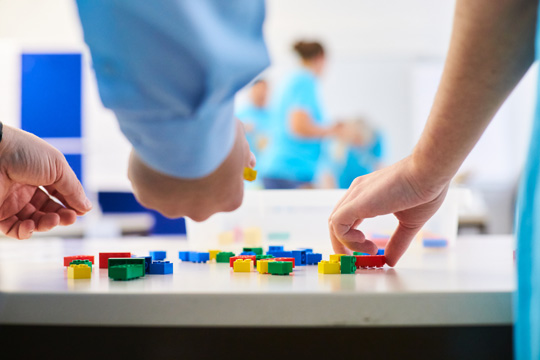
Learning with Lego: The participants simulate production processes with their blocks. It's an approach that makes abstract economic theory tangible. Photos: Harald Neumann
In the Herder Building or "Herderbau" in Freiburg a fresh breeze blows through Seminar Room 251 just after nine a.m. It's not coming in through the partially opened windows. It is instead – figuratively speaking – a component of a workshop on process optimization. Around twenty participants have been working for several minutes on a simulation task. Some of them are allowed to use "story cubes" – dice with symbols on them instead of numbers – while others are not. The task shows how different people address creative processes, the role that time plays, and which resources are important to their creativity. "Scarce resources can simultaneously stimulate good ideas," says the workshop's initiator, Stephan Lengsfeld, Professor of Finance, Accountancy, and Controlling at the Institute of Economics.
The event entitled "Innovation Processes in For-profit and Non-profit Organizations" is special because not just students – as is usual – are taking part. The directors and staff of Administrative Department 1 - Organizational Development and Controlling (D1), Facilities Services, and a staff council member are also joining in. Five status groups are represented in all. Their goal is to take a look at the lost-and-found process at the university during the Winter Semester of 2018/19, work out recommendations for its improvement, and implement them.
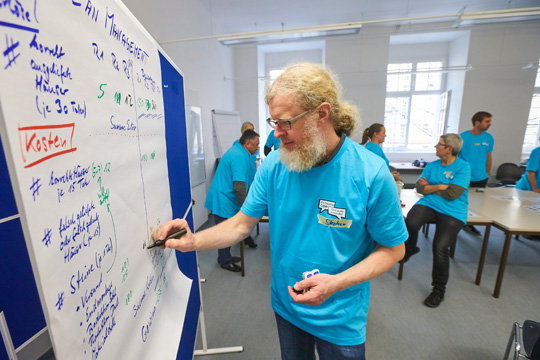
Initiator and game director Stephan Lengsfeld records the results of the first round of simulation. The concept behind the exercise is to change a single aspect of the production process in each round and observe the resulting effects.
"In the Co-Creation Camp, participants look at the process from very different perspectives, which is why they are able to develop ideas together that will improve the process in lasting and concrete ways," explains Lengsfeld. He elaborates: "We're open about the results of the project. We're starting off, moving forward nimbly, yet step-by-step, and we'll see what happens." Unlike classic projects, there are no three years of planning, he adds. "We gather feedback and suggestions from all the participants, ask other students and staff members at the university, try things out, and develop them further. What's important are the users' justified wishes, not something that we came up with as a conclusion ahead of time," emphasizes Lengsfeld.
The Co-Creation Principle
The workshop is of course just a small fragment within the mosaic that makes up the University of Freiburg. Nevertheless, it gives the institution's slogan "Connecting Creative Minds" a face and shows in detail, what's behind the larger university development strategy and how this strategy can be given life. "Leading-edge research and long-term structural transformation can only succeed when everyone at the university is taking part and involved. Working together on processes is key to make the university more livable as well," says Rector Prof. Dr. Hans-Jochen Schiewer.
The central part of the application submitted by the University of Freiburg on 10 December 2018 for the Excellence Competition is around sixty pages long. Among other things, it describes the rationale behind the slogan "Connecting Creative Minds," including promoting creativity, strengthening Freiburg's research image, and furthering the development of the European Campus of the European University.
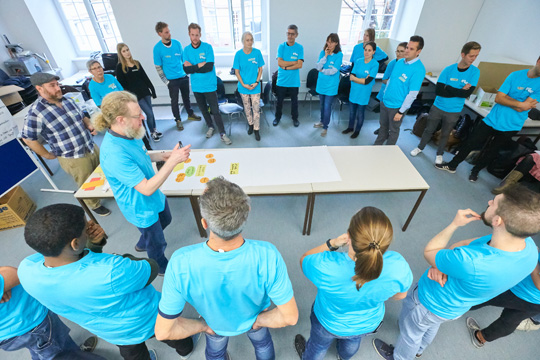
All the participants are wearing the same blue T-shirt with the lettering "Co-Creation Camp" on them. It helps to erase hierarchies and ensures everyone is on equal footing for the workshop.
Suited to these goals is the principle of co-creation, a management approach that is common at innovative enterprises and start-ups. Lengsfeld is using it in his event format. "It is a "workshop" for process innovation that goes beyond status groups. In it, university teaching and administrative processes, as well as the accompanying research, are linked with each other," explains the economist and adds with respect to the current workshop, that this is a real rarity. "I don't know of any other university that offers a seminar made up of such diverse groups," says Lengsfeld.
From experience to analysis
Management student Laura Fehrenbach is interested in organizational development. "What I really like is the different approaches that can be used to promote creativity," she says. Fehrenbach refers to the instructional concept called "EconRealPlay," which Stephan Lengsfeld has been working with since 2013. Economics students who are taking part use Lego blocks to simulate production processes. It's an approach that makes economic theory tangible and moves individual decision-making behavior into the spotlight.
The workshop participants this morning are applying this approach and continuing with further simulations. During one of them, they do several rounds of building small houses made of Lego. They work in five areas: materials procurement, base prefabrication, roof prefabrication, final assembly, and packing and quality control. The goal is to work as efficiently as possible and produce to meet market demand. At the end of the first round, the workshop participants have made a loss of a good 400 euros. They built twelve houses in five minutes, but only half of them were the color that met market demand. They made too many roofs, too, and had too much material in storage. "The idea of this simulation is to change individual aspects of the production process from round to round and observe the resulting effects," explains Lengsfeld, as the participants bring in big profits during the fourth round by implementing their own ideas.
Focus on lost-and-found
To apply the findings from different simulations, Stephan Lengsfeld opted for the practically oriented process of lost-and-found. "It had to be something that's run by the staff in D1 and is also related to the students," Lengsfeld says. The students were introduced to the different interfaces and learned about their problems first-hand from Department and Facilities Services' staff. Sergo Marikjan is someone who deals with lost-and-found items daily. He works at the entrance to the Rectorate, taking in lost objects and retaining them – in accordance with the law – for at least six months. "At the moment there are three cupboards filled to brimming with boxes," says Marikjan.
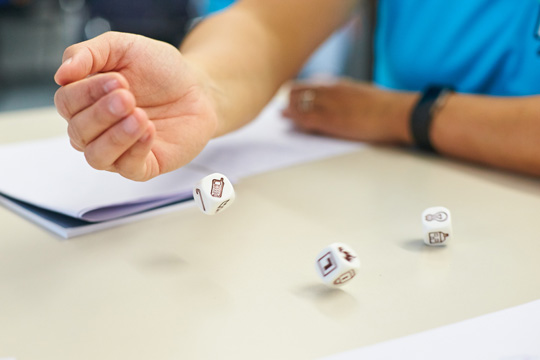
The assignment with Story Cubes – dice with symbols instead of numbers – shows how different people address creative processes.
The objects are also on a list stating the date on which and place where they were found. Due to the new directive for lost objects at the university, it is now possible to view the current list in a data protection compliant web app on the Intranet. That affects Maria Braun, who is responsible for implementing the web app in D1.1. "We use the Intranet to inform staff about issues that are important to daily life at the university. We can further develop the web apps, such as the list of found items, for example, to meet the needs of the process," she says.
During the coming weeks, the participants will cooperate closely and investigate every facet of the lost-and-found process in detail. They will find out exactly how it unfolds in practice. That will tell them what information is required by finders, those seeking lost items, and the administration, so that the system works as smoothly as possible. They'll also discover what data may be published on the Intranet. "It's not just a single process that always unfolds in the same way," Stephan Lengsfeld explains. He says he would like to compile the first set of results by the end of 2018. The students will write assignments in which they reflect on what they've learned and experienced and prepare and submit them in academic form. "It's also about the fun of developing something lasting. The university must continue to promote co-creation as a component of excellence to ensure it is seen from far and wide as a respected guiding light," concludes the economist. He's already convinced those who've taken part in the workshop, including staff council representative Christine Jägle. She is enthusiastically joining in. "It's very interesting to find out how what we've discussed in theory will now be implemented in reality," says Jägle.
Stimulate Understanding, Promote Interconnection
Walter Willaredt, the Director of Administrative Department 1 - Organizational Development and Controlling (D1), initiated the workshop on the lost-and-found processes together Stephan Lengsfeld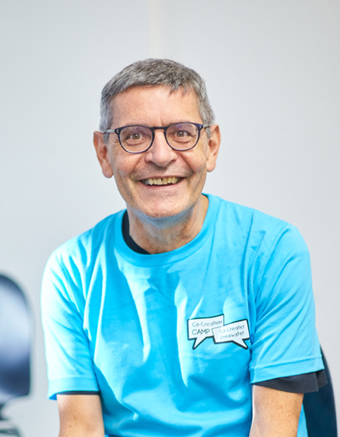 Herr Willaredt, what did you find exciting about the idea of a Co-Creation Camp?
Herr Willaredt, what did you find exciting about the idea of a Co-Creation Camp?
Walter Willaredt: The university has a great many experts – we must exploit that and integrate our own people more into the processes. Through workshops such as these we awaken understanding and promote integration between the individual departments and research and administration in a creative way. In my opinion, the administration has to make an effort to obtain more space in order to be able to react quickly in service of research.
Where do you see need for optimization?
In many places in the administration there is a lack of consciousness of how the processes are ultimately interconnected and influence each other. It's important to think of it in its entirety. Building the houses with Lego was a good example from the workshop. At first, each area only thought of its own needs, which in part even led to losses.
When do you expect to have comprehensive results?
Probably in January or February 2019. And then it's up to us to implement the recommendations for action that were worked out into the existing lost-and-found process. I'm eagerly looking forward it.
Judith Burggrabe
More about EconRealPlay
uni'lernen 2014 (only German)

